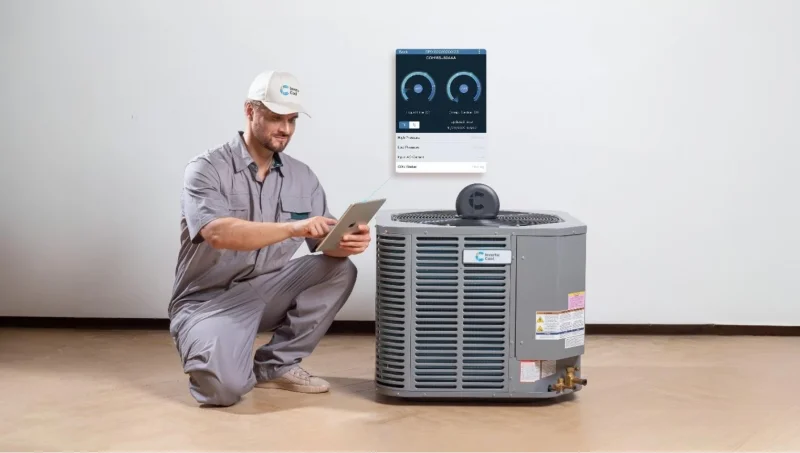Inverter HP Efficiency in Cold Regions Compared to Traditional HP

In cold regions like the northeastern United States, where temperatures can fall as low as 5°F, heating systems face serious challenges. Many believe heat pumps struggle in such extreme cold, but InverterCool’s inverter heat pumps defy this with their Energy Star cold climate certification. Having passed the toughest tests, these units deliver efficient and reliable heating even in the harshest winter conditions.
How Heat Pumps Work in Cold Climates
Heat pumps work by moving heat from outside to inside your home, even when it’s cold outside. They absorb heat from the air and transfer it indoors to warm your space. This process is efficient when temperatures are moderate but becomes harder as the air gets colder.
Traditional heat pumps often struggle in very low temperatures because they run at a fixed speed. When it’s extremely cold, they have to work harder or switch to backup heating, which uses more energy and reduces efficiency.
Why Inverter HPs Perform Better in Cold Regions
Inverter heat pumps use variable speed compressors that adjust their power based on the heating demand. This means they don’t have to work at full speed all the time. Instead, they run more efficiently by matching the outdoor conditions.
This technology helps inverter heat pumps maintain steady warmth, even in very cold weather. By running smoothly without frequent stops and starts, they use less energy and provide more consistent heating than traditional fixed-speed heat pumps.
InverterCool’s Cold Climate Certification
Energy Star’s cold climate certification is a trusted mark that shows a heat pump can perform well in very cold temperatures. To earn this certificate, a system must pass strict tests proving it can heat efficiently in harsh winter conditions.
InverterCool’s inverter heat pumps have earned this certification by completing the most demanding Energy Star tests for cold climates. This means InverterCool units have been verified to deliver reliable heating and energy efficiency even at temperatures as low as 5°F. Additionally, can achieve up to 80% heating output at 5°F, ensuring strong performance in very cold conditions.
For consumers living in cold areas, this certification provides confidence that InverterCool inverter heat pumps will keep their homes warm without excessive energy use or frequent breakdowns.
Practical Benefits of Choosing InverterCool Inverter HP in Cold Regions
InverterCool inverter heat pumps offer dependable heating, working effectively even when temperatures drop to -15°C or lower.
Compared to traditional heat pumps, InverterCool units use less energy, helping lower your electricity bills during cold months.
Because of their efficient performance, these inverter systems reduce or even eliminate the need for costly backup heating, making them a smart choice for cold climates.
Summary Table: InverterCool Inverter HP vs Traditional HP in Cold Climate
| Feature | InverterCool Inverter HP | Traditional HP |
| Operating Temperature | Efficient down to -15°C | Efficiency drops significantly |
| Energy Efficiency | High, variable speed compressor | Lower, fixed speed compressor |
| Cold Climate Certification | Energy Star certified | Often not certified |
| Heating Performance | Consistent and reliable | Less reliable in extreme cold |
Conclusion
InverterCool inverter heat pumps offer strong efficiency and reliable heating, even in cold climates where temperatures can reach -15°C. The Energy Star cold climate certification confirms their ability to perform well under harsh conditions. For anyone living in cold regions, InverterCool inverter heat pumps are a trustworthy choice that combines energy savings with dependable warmth all winter long.
Ready to stay warm and save energy this winter? Choose InverterCool inverter heat pumps, trusted for their cold climate performance and backed by Energy Star certification. Visit invertercool.com today to find the perfect system for your home and enjoy reliable heating even in the coldest weather.
1. Can heat pumps work efficiently in very cold climates like -15°C?
Yes, modern inverter heat pumps, like those from inverterCool, are designed to work efficiently even at temperatures as low as -15°C and deliver heating as high as 80% .
2. What does the Energy Star cold climate certification mean?
It means the heat pump has passed strict tests proving it can provide reliable heating and save energy in very cold weather.
3. How is an inverter heat pump different from a traditional heat pump in cold weather?
Inverter heat pumps adjust their compressor speed for better efficiency and consistent heating, while traditional heat pumps run at a fixed speed and lose efficiency in extreme cold.
4. Will an InverterCool inverter heat pump reduce my need for backup heating?
Yes. InverterCool inverter units maintain strong performance in cold weather and, when paired with a Dual Fuel system, can better meet your heating needs by optimizing efficiency and minimizing reliance on backup heating sources.
5. Is investing in an inverter heat pump worth it in cold regions?
Absolutely. Inverter heat pumps save energy, provide reliable heating, and have certifications to prove their effectiveness in cold climates.
Ti potrebbe interessare:
Segui guruhitech su:
- Google News: bit.ly/gurugooglenews
- Telegram: t.me/guruhitech
- X (Twitter): x.com/guruhitech1
- Bluesky: bsky.app/profile/guruhitech.bsky.social
- GETTR: gettr.com/user/guruhitech
- Rumble: rumble.com/user/guruhitech
- VKontakte: vk.com/guruhitech
- MeWe: mewe.com/i/guruhitech
- Skype: live:.cid.d4cf3836b772da8a
- WhatsApp: bit.ly/whatsappguruhitech
Esprimi il tuo parere!
Ti è stato utile questo articolo? Lascia un commento nell’apposita sezione che trovi più in basso e se ti va, iscriviti alla newsletter.
Per qualsiasi domanda, informazione o assistenza nel mondo della tecnologia, puoi inviare una email all’indirizzo [email protected].
Scopri di più da GuruHiTech
Abbonati per ricevere gli ultimi articoli inviati alla tua e-mail.
